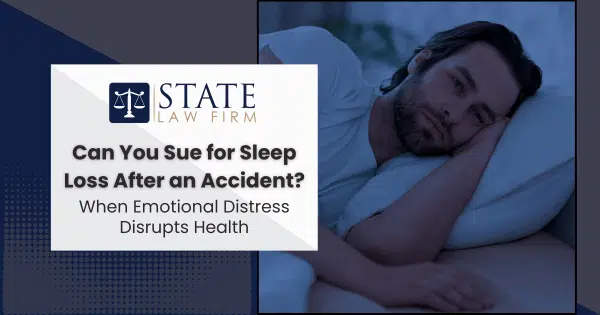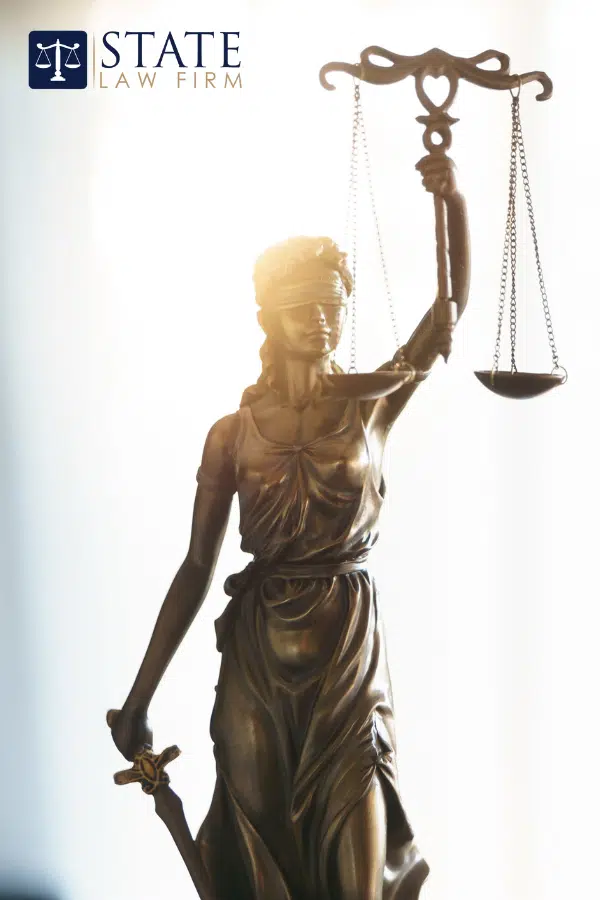After a serious accident, the harm is rarely just physical. Many people find that once the dust settles, the real battle begins at night: they cannot fall asleep, wake up from nightmares, or lie awake replaying the crash in their minds. Persistent sleep loss is not just an inconvenience. It can be a sign of significant psychological trauma that affects nearly every part of daily life, from work performance to relationships and long-term health. Before you decide, read our guide to Quadriplegia Lawyers Los Angeles to understand your rights and how claims are valued.
This article explains when accident-related sleep loss can support a personal injury claim, how courts look at emotional distress, and what you can do to protect your rights if your nights have never been the same since the crash. It is general information, not legal advice, but it can help you speak more confidently with an attorney about what you are going through.
Understanding Sleep Loss as a Legal Claim After an Accident
Sleep loss after an accident can show up in many ways: difficulty falling asleep, waking up repeatedly, nightmares, fear of going to bed, or feeling unrefreshed even after several hours of rest. For some people, the problem is physical pain that makes it hard to get comfortable. For others, it is mental: anxiety, intrusive memories, or a feeling that something bad will happen if they let themselves relax.
In California personal injury cases, this kind of sleep disruption is usually treated as part of “pain and suffering” or “emotional distress” rather than as a separate, stand-alone claim. In other words, sleep loss is a symptom that helps show the depth of your non-economic damages. When your lawyer or a jury evaluates what you have endured, they will not only look at medical bills and lost wages, but also how the accident changed your ability to live your life, including your ability to rest, recover, and feel safe in your own body.
In some cases, sleep loss is closely tied to diagnosed mental health conditions such as post-traumatic stress disorder (PTSD), depression, or generalized anxiety. In others, it is a serious but less clearly labeled consequence of trauma. Either way, persistent insomnia and related problems are important evidence of the harm you suffered.
If you are waking up night after night because of an accident someone else caused, you do not have to dismiss that as “just stress.” It may be part of a compensable injury, and it is something a personal injury attorney can help you document and present effectively.
The Link Between Emotional Distress and Sleep Disruption
Modern research confirms what accident survivors often learn the hard way: trauma and sleep are deeply connected. People who experience serious accidents face a higher risk of PTSD and other psychological injuries, and a large portion of those patients report chronic sleep problems. Insomnia, nightmares, and non-restorative sleep are now recognized as core features of many trauma-related disorders rather than side issues.
This is not simply a matter of feeling tired. Chronic sleep loss can:
- Worsen anxiety and depression
- Interfere with physical healing and pain control.
- Impair concentration, memory, and decision-making.g
- Increase the risk of additional accidents or injury.s
That creates a cruel loop. The accident leads to fear, flashbacks, or pain. Those symptoms make it harder to sleep. The lack of sleep makes the emotional distress worse, which in turn makes it more difficult to recover, return to work, or participate in family life.
From a legal perspective, this vicious cycle is significant because it illustrates the far-reaching ripple effects of an accident. When your lawyer argues for compensation, they are not claiming damages for “a couple of bad nights.” They are explaining how the trauma has undermined your body’s fundamental ability to restore itself, and how that has changed the entire course of your recovery.
Types of Accidents That Commonly Lead to Emotional Distress and Sleep Problems
Any traumatic event can disrupt sleep, but certain types of accidents show up again and again in cases involving severe insomnia and related symptoms:
Motor vehicle crashes. Car, motorcycle, truck, rideshare, and pedestrian collisions are among the most common sources of trauma-related sleep problems. Survivors may vividly re-experience the impact, fear of riding in cars, or replay what happened when they close their eyes.
Workplace and industrial accidents. Serious incidents at work, including falls from height, machinery accidents, or explosions, can leave lasting psychological scars. Workers may develop sleep problems alongside physical injuries and worry constantly about returning to the same environment.
Slip, trip, and fall incidents. A fall that results in a severe injury, especially for older adults or those who already feel physically vulnerable, can trigger significant anxiety and a fear of falling again. Pain from fractures or back injuries often compounds the sleep disruption.
Catastrophic injuries and long-term disability. When an accident causes spinal cord damage, brain injury, loss of a limb, or other life-altering harm, sleep problems are widespread. Physical discomfort, changes in brain function, and the emotional weight of a new reality can keep victims awake through the night.
It is not the label of the accident that determines whether you can recover for sleep loss. It is whether someone else’s negligence caused an injury, and whether your sleep disruption is reasonably connected to that harm. An experienced personal injury lawyer will focus on building that causal story with concrete evidence rather than relying solely on broad generalizations about trauma.
Proving Sleep Loss in a Personal Injury Lawsuit
Courts and insurance companies will not simply take your word that you cannot sleep. To recover compensation, you and your attorney need to present credible evidence that your insomnia or disrupted sleep is real, serious, and linked to the accident. Essential types of proof include:
Medical records and mental health documentation. Notes from your primary doctor, pain specialist, psychologist, psychiatrist, or therapist that describe difficulty sleeping carry significant weight. Diagnoses such as PTSD, adjustment disorder, anxiety, or depression, along with prescribed sleep medication, can help tie your symptoms to the trauma.
Sleep studies and specialist evaluations. In more severe or complex cases, a sleep specialist may perform a sleep study or offer a detailed assessment of how your nightly patterns have changed. While not always necessary, this type of expert can be beneficial in high-value claims.
Personal sleep logs and journals. A simple notebook or phone app can become valuable evidence. Recording when you go to bed, how often you wake up, whether you experience nightmares, and how you feel the next day helps create a timeline that shows persistence and severity.
Testimony from family, friends, and coworkers. People close to you can describe visible changes: snapping awake from nightmares, pacing at night, falling asleep at the kitchen table, or struggling to focus at work. Their observations can make your story much more real to an adjuster or jury.
Employment records. Documentation of missed work, reduced hours, performance warnings, or accommodations due to fatigue helps show the real-world impact of your sleep problems.
A practical first step is to talk honestly with your health care providers about your sleep, even if you think it is “just emotional.” Then, start documenting. The sooner you build a record, the easier it is for your lawyer to connect the dots between the accident, your mental health, and your nightly battle to rest.
Pain and Suffering: Calculating Damages for Lost Sleep and Emotional Harm
In California, pain and suffering and emotional distress are non-economic damages. They compensate you for human losses that do not come with a bill attached, such as persistent pain, fear, loss of enjoyment of life, and severe sleep disturbance. There is no fixed formula set by law, and there is generally no cap on these damages in standard personal injury cases, although specific categories of claims may have special rules.
When sleep loss is part of your claim, several factors influence how much it may be worth:
- How severe and frequent your sleep problems are
- How long they have lasted and whether they are likely to continue
- Whether they interfere with work, parenting, or daily activities
- Whether they are associated with diagnosed mental health conditions
Attorneys and insurers sometimes use informal tools, such as multiplying your economic damages by a factor or assigning a daily value to your suffering, to estimate a fair range for settlement. These are not binding rules, but they illustrate how critical it is to show the day-to-day impact of insomnia and emotional distress, not just their existence.
Sleep loss becomes even more critical in cases involving catastrophic injuries. When an accident leaves someone paralyzed or facing permanent disability, the emotional toll and loss of restorative sleep often extend for a lifetime. Before you decide, read our guide to Quadriplegia Lawyers Los Angeles to understand your rights and how claims are valued. Even if your injuries are different, that guide explains the kind of careful analysis that goes into high-stakes cases.
If you feel that an insurance company is brushing off your sleep problems as “stress that will pass,” that is a sign you may need legal help to make sure those harms are taken seriously in negotiations.
The Role of Legal Counsel When Suing for Emotional Distress-Related Health Issues
Claims involving sleep loss and emotional distress are often more complex than straightforward physical injury cases. The harm is real, but it is less visible, which gives insurers more room to argue that you are exaggerating or that your symptoms are unrelated to the accident.
A skilled personal injury attorney can:
- Help you speak with doctors and therapists in a way that ensures your sleep problems are accurately documented
- Identify the right experts to explain the connection between trauma and sleep disruption.
- Organize witnesses, records, and journals into a coherent narrative that makes sense to a jury.
- Push back against insurance tactics that minimize emotional harm or blame pre-existing conditions.
At State Law Firm, our attorneys understand that being unable to sleep is not a minor side effect. It can hollow out your days, strain your relationships, and make recovery feel impossible. We approach these cases with compassion and meticulous care, treating you as a whole person, not a file number.
If you believe your accident has stolen your sleep and peace of mind, you do not have to navigate the legal system alone. Speaking with a lawyer early can help you avoid mistakes, preserve critical evidence, and position your claim for the full value it deserves.
Takeaway: Your Sleep Matters, and So Do Your Legal Rights
Sleep is one of the foundations of health. When an accident caused by someone else’s negligence leaves you lying awake night after night, that loss is more than an inconvenience. It is a sign of real injury that the law can recognize and compensate.
You may be entitled to recover for insomnia, nightmares, and related emotional distress as part of a personal injury claim, especially if you seek treatment and document what you are experiencing. The next step is to have a candid conversation with an attorney who understands both the medical and legal dimensions of sleep loss. By doing so, you protect not only your case but also your chance to rebuild a life that feels safe, stable, and restful again.


